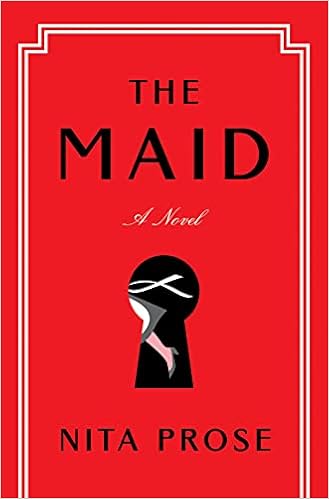4 Stars
The narrator of this
cozy mystery is 25-year-old Molly Gray who is on the autism spectrum, though
there is no reference to such a diagnosis.
She works as a maid in the Regency Grand Hotel, a job tailor-made to her
because she loves order and routine, is obsessive about cleanliness, and takes
great pride in returning things to “a state of perfection.” One day she discovers the body of Charles
Black, a wealthy man who frequently stays at the hotel with his much-younger
wife. Molly eventually becomes a suspect
and has to ask for help to prove that she is innocent.
Much of the appeal of the book for me was the character of Molly. Because of the point of view, the reader learns Molly’s fears, disappointments, and dreams. Since her grandmother’s death, Molly feels adrift and lonely, but she tries to live according to Gran’s lessons. She is honest, unfailingly polite, and hard working. Molly is socially awkward; she has difficulty reading social cues and facial expressions. At one point Molly admits that a woman who comes to her apartment is “the first guest to pass through the door in nine months . . . the first guest I’ve ever entertained on my own.” Because of her desperate loneliness, she trusts the wrong people. Because she is different, she is often the target of ridicule, being called “Molly the Mutant. Roomba the Robot. The Formality Freak.” Many guests at the hotel just don’t see her; Molly often speaks about being invisible. It soon becomes obvious that she is also being exploited by others.
Molly takes things very literally because she is unable to accurately interpret meaning and intention behind people’s words. Her literalness gets her into difficulty with the police who do not like her blunt responses. At one point, she is advised to “’remain silent at this time’” so when she is next asked a question, she doesn’t speak.
There is considerable suspense. One technique used to create this suspense is point of view. Since Molly is the narrator, the reader knows only what Molly sees, hears, does, and thinks; the reader has to determine which of her observations are accurate. Another technique used to create suspense is dramatic irony: the reader does understand some things which Molly does not. This irony creates suspense because the reader wonders whether Molly will realize the truth before she is placed in more danger.
Some plot issues bothered me:
Molly is very honest
and she tells her landlord she will have the overdue rent to him by the end of
the day, yet there is no indication she would have the money were it not for an
unforeseen stroke of luck.
There is a problem with Molly’s uniform. The impression is that she has only one uniform which is “dry cleaned daily in the hotel laundry.” One day, Molly is taken from the hotel to the police station and then driven home, yet when she gets to work the next morning, she is “greeted by my trusty uniform, crisp and clean.” Since she was not allowed to change out of her uniform, how could her uniform be waiting for her?
Why would a man travel with a deed to a property in his possession?
A woman knows which bank Molly uses?
Why do so many of the characters have names of colour: Molly Gray, Charles and Giselle Black, Cheryl Green, and Wilbur Brown? Even names like Mr. Snow and Mr. Rosso indicate a colour. Molly seems attuned to colour because she often describes the colours of what she sees, but Molly is not responsible for characters’ names.
Perhaps what bothered me most about these issues is that the author is described as “a longtime editor” who has “worked at several publishing houses.”
Characterization also has some weaknesses. Several of the secondary characters are one-dimensional. The good guys are really good, with no flaws, and the bad guys are really bad, with no redeeming qualities. At times, Molly does seem almost too gullible and naïve. She is an expert on episodes of Columbo but can’t recognize stereotypical villains like the “two behemoths with shaved heads and perplexing facial tattoos”?
I did appreciate that Molly does experience personal growth. She is aware of her flaws: “sometimes I overexplain, which I’ve learned can be annoying to others” and “It’s a fault of mine, to be quick to judge or to want the world to function according to my laws.” In the end, she comments, “I am learning to be less literal, less absolute about most things. The world is a better place seen through a prism of colors rather than merely in black and white.”
I did also appreciate that some themes are developed. For instance, the author comments on the perception and treatment of the working class. Molly refers to her uniform as “the ultimate invisibility cloak.” She describes being a maid as “existing in plain sight while remaining largely invisible” because hotel guests often totally ignore her or treat her like she is their inferior. One woman comments, “’Maids and doormen are often underpaid and undervalued’” and Molly learned from her grandmother that “You can’t judge a person by the job they do or by their station in life; you must judge a person by their actions.”
Despite its flaws, the book is an enjoyable read which I’d recommend to those who like cozy mysteries. Certainly the protagonist is engaging and has a unique voice. In a pandemic winter, a hopeful, heartwarming book is most satisfying.
Note: I received a digital ARC from the publisher via NetGalley.

No comments:
Post a Comment